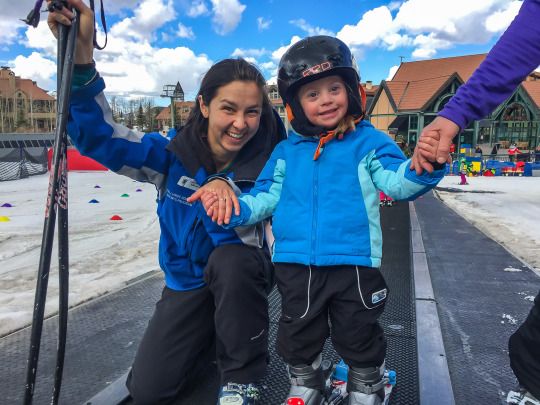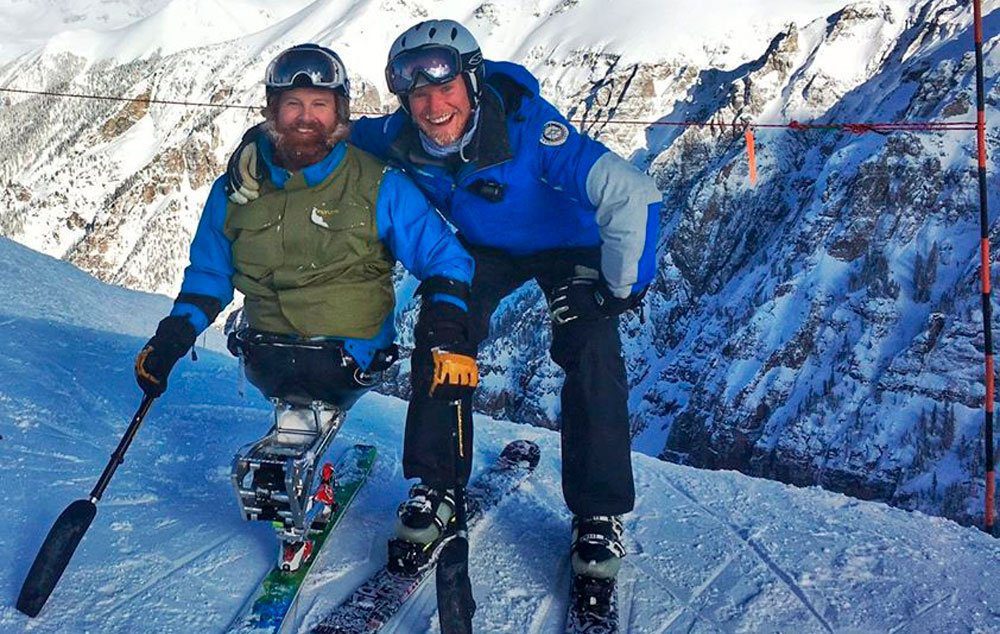“When you’re skiing, you’re not thinking about being overseas or bills or family or all the other stupid life stuff,” says Telluride ski instructor Scott Ostrom. “You’re just thinking, Don’t fall down. Have as much fun as you can, and don’t fall down.”
That feeling was especially freeing for Ostrom, who came back from two tours as a marine in Iraq with a traumatic brain injury and acute PTSD. He fell in love with the sport during an adventure retreat for wounded warriors. After two ski weeks with Telluride Adaptive Sports Program, an outfit that makes mountain adventure accessible to wounded warriors and others with physical or cognitive disabilities, he went back for a summer program in 2014. On the drive there, he wrote his proposed job description in hopes they would hire him — the experience moved him so much that he decided to make it his career. It worked, and he’s now TASP’s veteran liaison, helping vets of all abilities — PTSD sufferers, amputees, paraplegics — organize trips for special veterans’ weeks each winter. “These guys need a break from their minds, and skiing does that.”
That escape is sometimes just a start, as Ostrom, who also works as an adaptive-skiing instructor for TASP guests of all stripes throughout the season, has found that helping others gives him purpose. “I skied with a six-year-old girl with cerebral palsy on Christmas. She was the cutest thing in the world,” he says. “Best Christmas ever.”
 Telluride Adaptive sports allows skiers of all abilities to hit the slopes.
Telluride Adaptive sports allows skiers of all abilities to hit the slopes.
Better still: A few weeks later, he heard from her parents, and the news was better than expected after a single lesson. But that’s how powerful adventure sports can be: “She’s a totally different girl,” feeling confident enough to walk without her walker, making an effort to just go after life. It’s stories like hers, and similar ones from vets, that lead Ostrom to conclude, “This job has replaced going overseas to fight as a marine as the best thing I’ve ever done.”
It certainly has profound effects on the people who experience it. “Adventure travel is a powerful source of cognitive and emotional stimulation, challenge and accomplishment” for anyone, says Frank Farley, PhD, a professor of psychology at Temple University in Philadelphia. “Adventure in general can be a boon for disabled individuals. It can help to get them into experiences beyond the status quo, encouraging them into new behaviors that can strengthen their self-esteem, self-confidence, and self-efficacy.”
Take scientific support like that, new exoskeleton technologies that make movement easier, and the rise of high-profile disabled badasses like Erik Weihenmeyer, the blind adventurer who has climbed all Seven Summits, and it’s no wonder adaptive adventure travel has lately grown by leaps and bounds.
According to Wikipedia, adventure travel for the disabled has become a $13 billion-a-year business in North America. And although the Adventure Travel Trade Association doesn’t keep stats on adaptive travel, an inquiry I made through that organization quickly connected me with dozens of operators. (DisabledTravelers.com lists even more.)
Source: Yahoo



